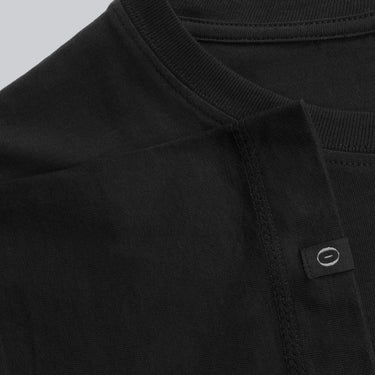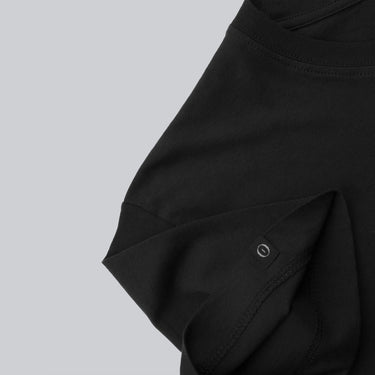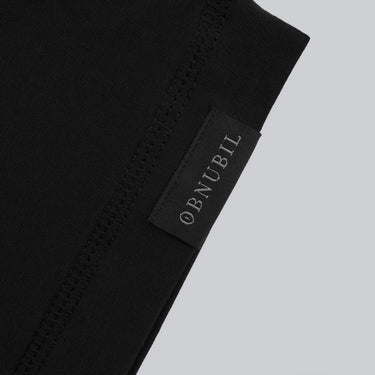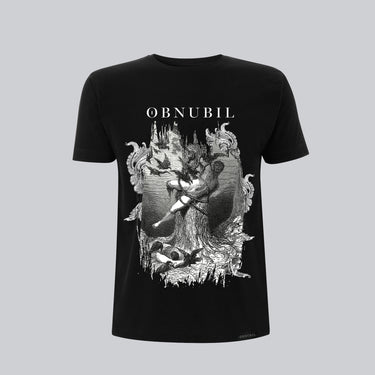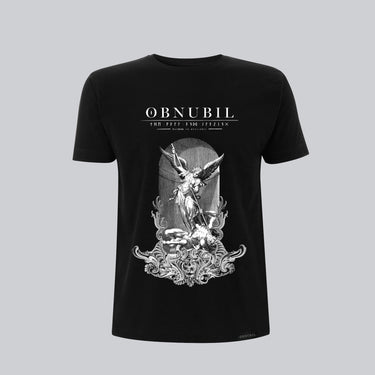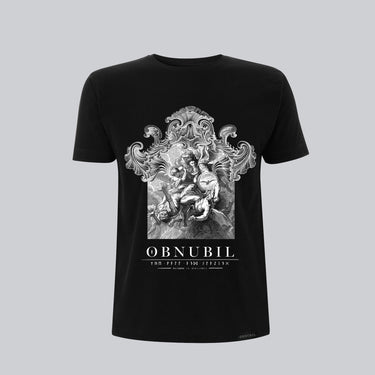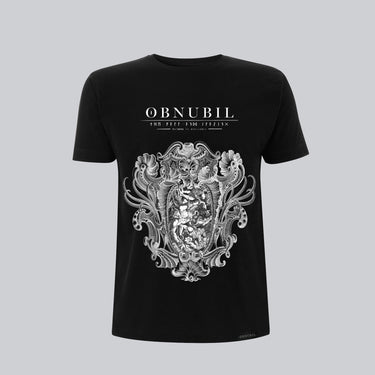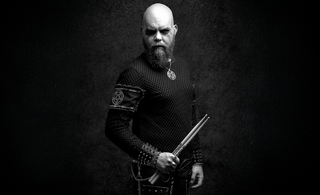
In a world where extremes collide—the raw, the ritualistic, the restless—Joakim Sterner stands resolute behind the drum kit as Necrophobic’s drummer, founder, and original member. Since 1989, he has forged a legacy that pulses with darkness, melodic fury, and icy precision. In this interview, he shares how a summer camp cassette of Iron Maiden ignited a lifelong devotion; and how his drumming philosophy has prioritized foundation and groove over flash and speed. From his early influences in 80's metal to his intentional restraint in riff-driven chaos, he balances tradition and innovation over three decades. As summer 2025 brings shows across Europe, Joakim reflects with unwavering clarity: the music endures because the fans do. And as he says plainly yet powerfully, “If it wasn’t for you, we wouldn’t be here today.”
INTERVIEW
OBNUBIL: Joakim, before we descend into blast beats and infernal rhythms — let’s step outside the rehearsal space for a moment. After more than three decades of channeling darkness through drums, how is life treating you these days as the man behind the music? Not just as the force behind Necrophobic, but as someone balancing the noise with silence, the ritual of creation with the unpredictability of everyday life. Have there been recent moments — onstage or somewhere far from the stage — that unexpectedly reminded you why you still do this after all these years?
Joakim: Right now I am enjoying some free time, but I already long for the next show we are doing in Portugal this month (August 23) at a festival called Milagre Metaliero Festival. Music is my life and I am grateful that the Necrophobic music has taken me to all different parts of the world.
OBNUBIL: Can you trace back to the first time music possessed you — not just something cool to listen to, but a moment where sound cracked something open inside you? Was it a particular drum pattern, an atmosphere on an old cassette, a concert that felt like a rupture in reality? When did it stop being background noise and become a force that shaped who you are — not just as a drummer, but as a person drawn to the darker, heavier spectrum of existence?
Joakim: I have listened to music for all my life as far as I can remember. My earliest memories of music is ABBA and Elvis Presley, but when I started school I got friends that listened to all kinds of music, from ABBA I went to a lot more rock oriented music and there were some Swedish punk bands I came across that caught my interest because it was more raw. Then I was at a summer camp in 1982 and a friend played Iron Maiden, from that time I knew what my music was. Those heavy drums and those heavy guitars…
OBNUBIL: Growing up in Sweden during the 1980s meant living through both the welfare-state stability and a growing cultural restlessness. Did you feel any kind of existential friction between Sweden’s clean, rational society and your growing interest in chaos, darkness, and anti-mainstream music? How did the culture around you — school, family, politics — react to your musical choices back then?
Joakim: It actually was really no problem. I had parents that didn’t care so much about what I was doing. They saw my huge interest in music and saw that my money was spent on buying albums and also going to concerts, small and big ones. I guess they felt that I was really engaged in something that did not involve anything illegal. So they were kind of supportive, one can say. Sweden was and is a free country.
OBNUBIL: Forming a band like Necrophobic in 1989 meant building everything from scratch: sound, identity, aesthetic — often with no role models that blended black and death metal the way you envisioned. Can you take us into that mindset? What was driving you and David at that time — was it rebellion, boredom, obsession? What kind of world did you want to conjure through the music that didn’t yet exist?
Joakim: As we early adopters of this new music that started to grow, we went to the small gigs around here in Stockholm, we started to buy demos and danzines. We liked it a lot and wanted to form our own band. Back then, the term Black Metal was not really a genre of its own, really. I don’t even think Bathory called their music Black Metal and Venom absolutely did not call their music Black Metal. They had only that title of their second album. Anyhow, we were drawn to the imagery of early Destruction and Sodom, for instance. They looked very raw in their photos. We felt that we had to go in that way to present ourselves, rather than to have shorts, flannel shirts and caps that most bands had both on stage and in their photos. We wanted to have long, black pants, preferable leather pants, bullet belts and leather jackets.
OBNUBIL: Your first releases like "The Call" and "The Nocturnal Silence" already had a fully formed aesthetic — not just musically, but visually and thematically. Where did that early inspiration come from? Were you influenced by horror films, occult books, or Swedish folklore? How important was the visual world to your early vision of Necrophobic?
Joakim: Music wise, we were influenced by Slayer, Sepultura, Bathory, Sodom to name a few. We early understood the importance of having melodies as a solid foundation in our music and we still carry that torch in our music writing. Prior to the releases you mention, we also released 2 very successful demo cassettes whereas the later one, the second, really sold a lot due to a great help from an American underground label. With that said, I want to tell that we had our first steps taken before releasing the vinyl EP “The Call” and the debut album “The Nocturnal Silence”. Lyric wise, we took influences from horror movies, but those movies with a more dark and satanic story. Occult books were also a source for writing lyrics. Both our music and lyrics had an idea of visualising things in your head while listening to our music. Like a movie.
OBNUBIL: If someone completely unfamiliar with Sweden asked you to explain the emotional tone of Necrophobic in relation to your homeland, what would you say? Would you describe it through weather, history, legends, or something harder to pin down — like silence, distance, or detachment?
Joakim: I’d say our music sounds dark, evil and eerie in a grand, cold and icy landscape.
OBNUBIL: You’ve been the unshakable backbone of Necrophobic since 1989 — a rare case of rhythmic and ideological continuity in a band whose sound and line-up evolved over decades. Looking back, how has your drumming vocabulary grown in response to the band’s evolution from its more death-metal rooted origins to a blackened melodic direction? Were there specific albums where you deliberately altered your approach — even rethinking your snare or ride work — to serve a new identity in the band’s soundscape?
Joakim: My drumming has more or less been in the same way throughout all these years. I was never the star of the band and I have never wanted to shine. The main purpose of my drumming is to be the solid foundation of the music and carry the guitars and melodies and the vocals, and let those instruments shine. With that said, I of course are picky with how they sound and how I can progress the sound of the drums when I play. I have had so many different sounds throughout the years and nowadays I know more of how to get the sound of my drums to be pleased and also be pleased in the soundscape with all the other instruments.
OBNUBIL: You started Necrophobic in the golden era of Stockholm death metal, yet you carved out a path that was colder, more occult, and more melodic than many of your peers. Can you talk about the drumming influences that were not part of that typical Swedish DM stew? Were there any non-metal or even classical percussion elements that shaped your rhythmic sensibility in those early years?
Joakim: The drummers that influenced me are mostly drummers from the 70's and early 80's metal. They have more rhythm in their playing because the music they played didn’t have as high a pace as our music has. OK, Dave Lombardo is an influence for me as well, but Slayer isn’t as fast as today's extreme metal. The modern drummers of today don’t have so much groove in their playing. They just play extremely fast, if you know how I mean. There is nothing wrong with playing extremely fast, but the groove is gone.
OBNUBIL: There’s something hypnotic and ceremonial in the way you build tension — especially in mid-tempo passages — that feels ritualistic rather than aggressive. How much of that is intentional, and how much is instinct? Could you walk us through your mindset or visualization when crafting drums for a song like "Darkside" or "The Infernal Depths of Eternity"? Is there a spiritual or esoteric layer that enters your drumming decisions beyond technique?
Joakim: Thank you! Well, I have talked a little about it already, but my main intention of playing drums is to lift what the other instruments are playing. Not to “stand in the way” or “compete” to shine. I want to be the solid foundation and as often as I can, dare to do something different to what is expected, to make it feel more alive and groovy, without lacking power.
OBNUBIL: You’ve often said that Necrophobic is driven by the feeling rather than trends or technical competition. Yet your drumming consistently walks a fine line between tight control and primitive chaos. Do you see your playing as more of a conduit for the energy of the riff — or are you sculpting rhythmic narratives that speak parallel to the guitars? How do you approach songwriting with guitarists, especially when structuring dynamics around melodies that could either be majestic or hellish depending on your choices?
Joakim: I try to play extreme drums, but as a heavy metal drummer from the 80's did it, or would have done. When I hear the guitar riff/melody for the first time, I often know directly what kind of drums I want to play along with it. And nowadays as I am older and wiser and also with a little self confidence as well, haha, I rather go for a more dynamic drum beat than what is expected. Drums are power!
OBNUBIL: As someone who’s been part of the Swedish extreme scene for 35 years, you’ve seen several generations of drummers come and go. Are there any obscure or underrated Swedish drummers — maybe from the early 90's tape-trading era or demo bands — who inspired you or whom you think deserve more recognition for their impact?
Joakim: No one comes to mind, as far as being unknown or underrated. Nicke Andersson (drummer of Nihilist and Entombed) was an influence to me as far as speaking death metal drumming, but he is not obscure, nor unknown, haha.
OBNUBIL: In blackened death metal, there’s often a push for relentless speed — but your style tends to use strategic space, creating a kind of infernal grandeur. How do you balance the need for aggression with the power of restraint, especially in an era where blast beats are sometimes overused? Are there moments where you’ve deliberately held back speed to preserve a riff’s emotional impact or atmosphere?
Joakim: I can’t play extremely fast, as today’s younger drummers can do. I don't have that technique. I am an old school kind of drummer that plays without any form of modern equipment, such as triggers and stuff like that. With that said, I must play the way I can and try to do the best out of it. Our music is not as extremely fast as the bands that have competitions on who’s the fastest band around. I have played for 35 years in this band. Other bands have had 35 different drummers already.
OBNUBIL: Many fans see Necrophobic as a torchbearer of a very specific kind of Swedish darkness — a sound that feels cold, mythic, and warlike. If we were to map your drumming style onto something archetypal — a Norse deity, a natural force, or even a historical figure — what would that be, and why? Do you see your role in the band as more like a war drummer, a storyteller, or a ritual master?
Joakim: I haven’t ever thought about that, in the way you put it. I’d say it is a natural force - and the heart of this band.
OBNUBIL: If we entered your rehearsal room and opened your old practice notebooks or mental logs, what kind of exercises or motifs would we find you obsessing over throughout the years? Do you use particular rhythmic cells or accents that have become almost signature "Joakim" moves, even if listeners don’t consciously register them?
Joakim: Haha, you would not find any notes! I have everything in my head. If you want to know a detail in my drumming that is not so much spoken about officially, is that I copied a detail from Igor Cavalera’s (Sepultura) drumming. Every time I hit a crash, in the fast beats, I drop a direct hit on the snare after hitting the crash. I have done it from day 1, haha.
OBNUBIL: Sweden is often romanticized for its musical output, but it’s also shaped by long winters, Lutheran stoicism, and a certain tension between modernity and pagan roots. How do you think your cultural environment — growing up in Sweden during the 80's and 90's — sculpted your musical aggression and aesthetic leanings? Do you think Necrophobic could have sounded the same had you been born in Southern Europe or the U.S.?
Joakim: Our music is definitely shaped from our environment. We have 4-6 months of much darkness up here in the north. That has much to do with our art of all kinds and how we are as persons. If we would have come from other parts of the world, we’d surely have been sounding differently.
OBNUBIL: Imagine someone tried to capture your drumming philosophy in a single, non-musical metaphor — say, a mechanical system, a Nordic myth, or even a specific landscape. What image comes to your mind first, and how does that reflect your approach behind the kit over these decades?
Joakim: Now you are asking that weird kind of question again, haha. I’d say that I’d be a stone, shaped by the force of nature for years. Rough and sharp in some places, but also smooth and gentle in other places.
OBNUBIL: Joakim, you’ve built your legacy not through constant reinvention, but through unwavering intensity and vision. Still, after decades in the underground, we know the fire never really settles. So tell us — what’s brewing in the shadows right now? Are there new releases, live rituals, or unexpected collaborations forming in the depths? What can the followers of Necrophobic — and of your creative path — expect to emerge in the coming months?
Joakim: Next up are shows in Portugal, England, Turkey and Spain, I think. As of now, we are not in a studio to record a new album. When that time comes, you all will know. I think there are more shows already booked for 2026, but as they are not confirmed officially yet, I would rather not tell here.
OBNUBIL: It’s been a real honor stepping into your world — thank you for sharing it with such depth and clarity. Before we let the ritual end, is there anything you’d like to say to those who’ve followed Necrophobic through the decades of transformation and devotion? Any final words to the faithful — whether it’s gratitude, warning, or just a reminder of what this music still means to you, after all this time in the eye of the storm?
Joakim: Thank you for wanting to speak to me. Interesting question, indeed. I would like to take the opportunity to say Thanks to all of you that have supported Necrophobic all these years - and also to all the new fans that have been supporting us the last couple of years. It means a lot to me to see that a new and younger audience and fans have shown up to our concerts. You all give us motivation to carry on and you give us the strength and the confidence to do so, as it is proof that we still make great music. Remember, if it wasn’t for you, we wouldn’t be here today! Thank you!
Interview done August 2025. Cover photo by Jens Rydén.




